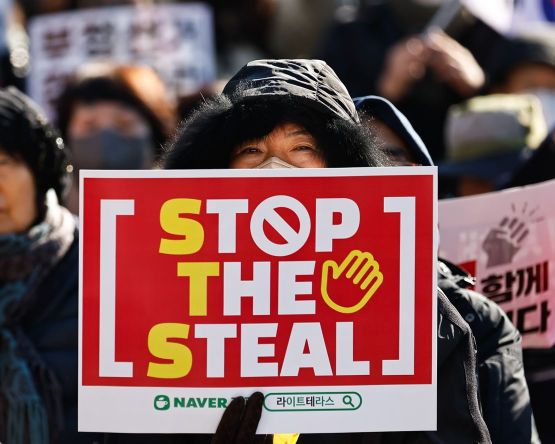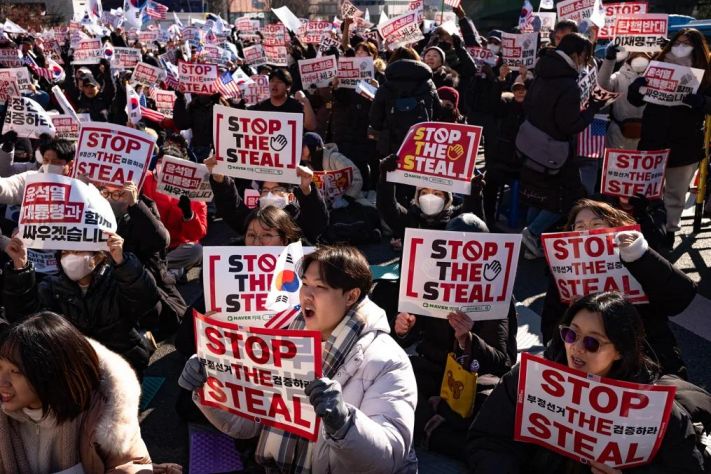By Eric Vandenbroeck and co-workers
MAGA Abroad Including South
Korea
Elon Musk’s personal
foreign policy of promoting far-right parties is sparking outrage among leaders
in Europe and handing them a
dilemma: How do they rebuke
the tech titan without angering his new patron, Donald Trump?
Musk could easily be
dismissed as a mischievous antagonist who simply loves to shock and is pursuing
his obsessions one X post at a time.
But he’s not just
some troll. He’s the world’s richest man, owns some of the globe’s most
strategic and influential businesses, and is wielding a mighty social media
network. Musk is highlighting his enormous influence as a populist force
galvanizing political provocateurs as a kind of one-man supranational non-state
power.
— British Prime
Minister Keir Starmer, who has been targeted by Musk for weeks, warned the SpaceX owner had crossed “a line” after he said
the British minister responsible for safeguarding children should be jailed and
was an apologist for rape.
— French President
Emmanuel Macron accused Musk of fueling a new “international reactionary
movement” and intervening in elections.
— Norway’s Prime
Minister Jonas Gahr Støre said it was
“worrying” that a
man with such power was so directly involved in the affairs of other countries.
— The German
government has already
criticized the
multi-billionaire for backing a far-right pro-Russia party, the Alternative for
Germany (AfD), in upcoming elections. Musk will host
the party’s leader in an interview on X this week.
We earlier already
covered the political difficulties in South Korea
whereby now MAGA-like hats and slogans suddenly are also part of President
Yoon’s impeachment drama.
Crowds of people
wrapped up against the bitter January cold clutch signs emblazoned with the
slogan “Stop the Steal,” wave US flags, and don red MAGA-like hats.
But this scene is
11,000 kilometers (7,000 miles) away from Washington, DC, in the South Korean
capital Seoul, where throngs of die-hard conservative supporters of the
suspended President Yoon Suk Yeol have gathered outside his home to protect the
embattled leader from arrest.
Yoon successfully
resisted an attempt to detain him on Friday after an hours-long
standoff with
authorities over his dramatic but
short-lived declaration
of martial law in December that plunged the country into political chaos.
For Yoon’s
conservative supporters who have the adopted the slogans and iconography
associated with the MAGA movement, they see similarities between South Korea’s
current political crisis and the US, where twice-impeached Trump is set to take
office for a second term on January 20.
The US is South
Korea’s most important ally, an alliance that has gone back decades.
South Korean
conservatism, which includes Yoon’s ruling People Power Party, holds strong
bonds with the American conservative and evangelical movements. And Yoon’s
followers have claimed the April 2024 national election, which the opposition
won in a landslide, was stolen from them.
They now believe a
president may be stolen from them, too, despite a lack of evidence.
“I’m here for democracy.
The election was rigged and we need to defend our country,” one Yoon supporter
told CNN from outside the presidential residence Friday.
A slogan rooted in conspiracies
In his speech
declaring martial law, Yoon labeled the opposition’s actions “clear anti-state
behavior aimed at inciting rebellion,” referenced “threats posed by North
Korea’s communist forces,” and vowed to “eliminate anti-state elements.”
His words echoed
right-wing conspiracy theories that have been spread widely online by South
Korean YouTube commentators and activists.
But they also
mirrored rhetoric used
by Trump against his
opponents, with references to an “enemy from within” and the “radical left.”
In the US, “Stop the
Steal” emerged as a battle cry for Trump and his allies to trumpet groundless
claims that President Joe Biden was trying to steal the 2020 election. After
Trump’s loss, his supporters stormed the US Capitol on January 6, 2021, in an attempt
to thwart Congress’ certification of Biden’s win. Trump and his high-profile
allies have espoused myriad claims of election fraud, none of which were
verified or upheld in court.
That story rhymes in South Korea.
President Yoon’s
conservative party lost the country’s April 2024 general election in a
landslide, when all 300 seats in South Korea’s National Assembly were on the
ballot.
Yoon suggested
election fraud after his failed martial law declaration, alleging in a speech
on December 12 that South Korea’s election computer systems were compromised by
North Korean hackers.

Protesters with both
American and South Korean flags and 'Stop the Steal' placards gather to show
support for suspended President Yoon Suk Yeol, in Seoul, South Korea, near the
presidential residence, on January 4, 2025.
The allegations have
never been substantiated by national election authorities, or the country’s
judiciary. South Koreans all vote with paper ballots, and hard copies of their
votes are preserved.
On the night he
declared martial law, Yoon sent about 300 troops to the National Election
Commission (NEC) offices. Security footage shows troops entering the building,
with one solider appearing to take a photo of election servers. Later, former
Defense Minister Kim Yong-hyun said troops were
deployed there to look into the suspected election fraud.
“Yoon’s claims are
exaggerated and not true,” the NEC said after Yoon’s suggestion of North Korean
election interference. “No evidence of outside intrusion into the election
system was found. The security system was enhanced prior to the April
elections.”
A strong US alliance
Analysts say the
“Stop the Steal” slogan is a new phenomenon in South Korea, but the American
flag has long been spotted at right-wing political rallies.
South Korea’s
conservative electorate widely views the United States as a bastion of freedom,
democracy, anti-communism, and the home of a strong evangelical Christian
community.
The political right
has also “long emphasized” the importance of the American alliance, the crucial
US assistance during the Korean War in the 1950s and continued military and
security allyship, according to Byungwon Woo,
professor of international relations at Yonsei University.
The right, he said,
has “accused the political left of souring the alliance and instead,
approaching closer to China, being friendly to North Korea.”
It’s a feeling that
was shared among Yoon’s supporters outside his residence on Friday.
“The other side, the
left, they’re communists,” said one Seoul resident in his 60s. “We’re not all
right-wing. We’re normal people who don’t want communism from the left.”

Some Yoon supporters
outside his residence hope Trump will hear their concerns and even come to his
rescue.
“I hope that Trump
will take office soon and raise his voice against the rigged elections in our
country plus around the world to help President Yoon to return (to power)
swiftly,” Pyeong In-su.
Pyeong In-su, 74, said that the police had to be stopped by
"patriotic citizens", a term Yoon used to describe that standing
guard near his residence.
Yoon
has been isolated since he was impeached and suspended from power on
December 14.
Separate from the criminal
investigation, his impeachment case is currently before the Constitutional
Court to decide whether to reinstate or permanently remove him. A second
hearing in that case is scheduled for later on Friday.
For updates click hompage here